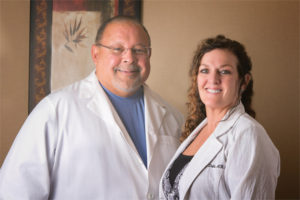Prostate cancer is the third leading cancer among males. It is often a silent killer, as it rarely shows signs or symptoms until it has developed maturely and even metastasized into other areas of the body. This year alone, it will take over 26,000 men’s lives. But it doesn’t have to be this way; just a simple examination and getting regular checkups can alleviate these grim statistics.
Even though there are rarely signs of early prostate issues, some of the most common symptoms of the disorder are:
• Weak urination
• Interrupted urination
• Frequent urination
• Blood in urine
• Painful ejaculations
• Pain in pelvis, hips or thighs
Screening and Diagnosis
There are several different standard tests that urologists use to determine Prostate cancer or prostate disorders in men. The first is a digital examination by palpitating the prostate through the rectum to feel if it is enlarged. The second testing is done through a PSA (prostate-specific antigen) count. The blood is tested for these specific protein-synthesized prostate cells, the higher the number of PSA, the more likelihood of impending prostate cancer. These screenings can’t tell for sure if you have cancer, so diagnostic testing is needed if one of these screening tests is abnormal.
The most advanced method for diagnosing prostate cancer is known as multiparametric MRI or MP MRI. It’s the best way to determine and diagnose prostate health.
Early and accurate diagnosis is critical and saves lives. The earlier your PSA levels are checked, the better your chances of successful treatment and survival rate of prostate cancer
At-Risk Patients
The American Cancer society recommends men start getting their prostate checked at age 50. For men with an increased cancer risk this age drops to 45. This is especially important for men who have a family history of cancer.
Family history including prostate, breast, colon and other forms of cancer can indicate a higher risk of developing prostate cancer. Some men are genetically predisposed to developing cancer and should ask their physician about new genetic testing to determine their risk.
Treatment
Every Cancer is different, and treatment plans should always be tailored to each patient. Depending on the patient’s overall health, age, stage of cancer, PSA or Gleason scores, size of the tumor, and personal circumstances, the treatment may vary significantly. For some patients, a “watch and wait” approach may be appropriate, while for others radiation therapy or more invasive surgical and oncology options are better suited. You should always consult with an experienced urologist to determine your best plan of action when dealing with any prostate issues.
Advanced Treatment Options
• Cryotherapy (cryosurgery): Cryotherapy involves the use of liquid nitrogen injected into the prostate to kill the cancerous tissue. This often will destroy healthy prostate tissue as well.
• High-Intensity Focused Ultrasound (HIFU): Use of focused ultrasound waves to destroy cancer cells while limiting damage to surrounding tissue.
• Hormone therapy: Medication which regulates or inhibits the production of testosterone and therefore may slow the growth of prostate cancer.
• Radiation therapy: This involves the application of an external beam of radiation directed to the prostate and the prostate bed. Uses very advanced technologies – Image Guided Radiation Therapy (IGRT) and Intensity Modulated Radiation Therapy (IMRT) to allow radiation to be delivered in a more targeted and precise way than ever before, without having to use needles. This minimizes damage to healthy tissues around the prostate.
• Surgery: A successful option for some patients is a radical prostatectomy or surgical removal of the prostate. New advanced surgical techniques include robotic-assisted surgery, which minimizes scarring and recovery time.
Erectile Dysfunction
Often a side effect of prostate cancer treatments, Erectile Dysfunction has many safe and effective treatments including:
-medication therapy
-vacuum erection devices
-injections
-penile implants
-other cutting-edge treatments
A frank conversation with your urologist can often identify the most effective treatment option for you.
Dr. Ramon Perez-Marrero, Board-Certified Urologist
 Dr. Perez is one of the country’s leading urologists, with nearly 40 years of cutting-edge research, surgical, and clinical experience. Dr. Perez and Nancy Dahl, ARNP practice with Advanced Urology Institute out of the New Port Richey, FL location. They are open 5 days a week, and also host a Men’s Health Clinic held Bi-monthly focused specifically on men’s health issues that are often side effects of prostate cancer.
Dr. Perez is one of the country’s leading urologists, with nearly 40 years of cutting-edge research, surgical, and clinical experience. Dr. Perez and Nancy Dahl, ARNP practice with Advanced Urology Institute out of the New Port Richey, FL location. They are open 5 days a week, and also host a Men’s Health Clinic held Bi-monthly focused specifically on men’s health issues that are often side effects of prostate cancer.
If you have concerns about your prostate health or side effects you are experiencing after prostate cancer, please call Advanced Urology Institute and ask for Dr. Ramon Perez today at (727) 375-1975.
Upcoming Community Talks:
“Life After Prostate Cancer”
Presented by Dr. Ramon Perez
Thursday, September 27th 5:30-7:00pm
New Port Richey Surgery Center
Check Also
Revolutionizing Healthcare: Exploring Regenerative Medical Treatments at QC Kinetix
By Daniel Sucherman, MD In recent years, the field of regenerative medicine has emerged as …
 Central Florida Health and Wellness Magazine Health and Wellness Articles of the Villages
Central Florida Health and Wellness Magazine Health and Wellness Articles of the Villages


